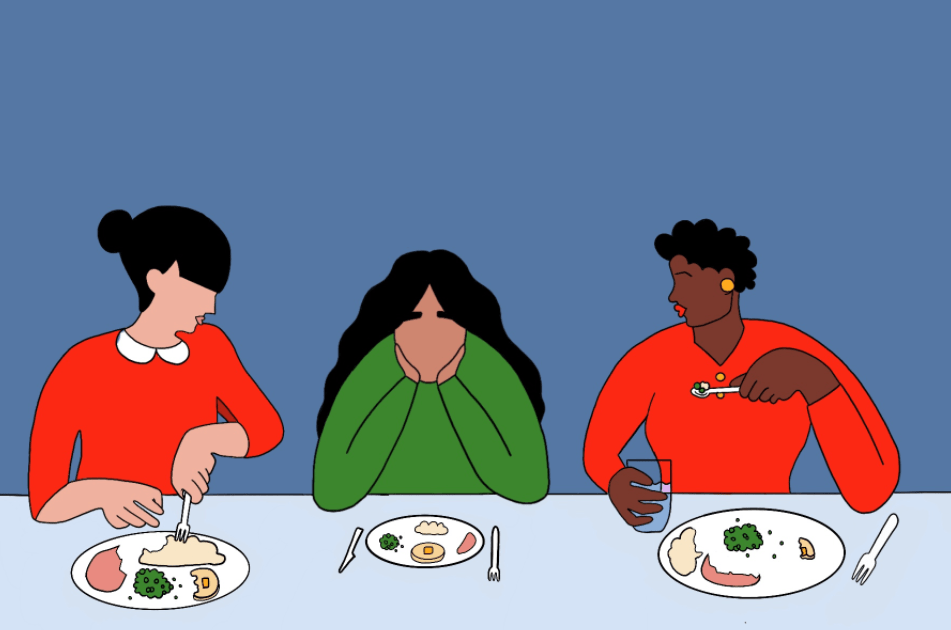Do you sometimes feel like you can’t stop eating? Are you constantly worried about your weight and body shape? If so, you may be struggling with an eating disorder. An eating disorder is a serious mental illness that can have devastating consequences when left untreated. In a blog post, we will discuss the signs, symptoms, and treatment of eating disorders. We will also provide information on how to get help if you think you may be suffering from one.
Contents
What Does ” I Think I Have Eating Disorder” Mean?

When someone says they think they have an eating disorder, it means that they are experiencing symptoms of an eating disorder and feel that these symptoms are negatively impacting their life. While someone may be able to identify some signs and symptoms of an eating disorder on their own, it is always best to seek professional help to ensure an accurate diagnosis and get started on the road to recovery.
There are many different types of eating disorders, with their own set of signs and symptoms. However, there are some general warning signs that may indicate that someone has an eating disorder.
There can also be many causes of eating disorders. For some people, there may be genetic or biological factors that play a role. Others may develop an eating disorder in response to trauma or stressors in their life. And for some people, cultural messages and norms around body image and dieting can contribute to the development of an eating disorder.
If you think you might have an eating disorder, it is important to reach out for help. Eating disorders are serious mental illnesses that can have a profound impact on your physical health. They can also be deadly if left untreated. But with professional treatment, many people with eating disorders go on to lead happy and healthy lives.
Signs When Someone Thinks ” I Think I Have an Eating Disorder “

There are many signs and symptoms that may point to an eating disorder. It is important to be aware of these signs in order to get the help you need as soon as possible.
Some common signs and symptoms of eating disorders include:
Preoccupation With Food
One of the main signs, when someone thinks that they have an eating disorder, is a preoccupation with food. This may look like spending a lot of time thinking about food, planning meals, or feeling anxious about eating.
You may also become fixated on certain foods or food groups and feel that you need to eat them in order to be happy or satisfied. For people with anorexia nervosa, this often looks like an obsession with healthy or “clean” foods. People with bulimia nervosa may focus on high-calorie foods or “junk” foods.
Changes in Eating Habits
Another sign that someone has an eating disorder is a change in their eating habits. This may include skipping meals, cutting out entire food groups, or eating very small portions.
You may also notice that the person is eating more frequently or in larger amounts than usual. This can be a sign of a binge eating disorder. People with this disorder often feel out of control when they are eating and eat until they are uncomfortably full.
Weight Loss or Weight Gain
Changes in weight are another common sign of an eating disorder. These changes may be sudden or gradual. If you notice that someone has lost a significant amount of weight, it may be a sign that they have anorexia nervosa. On the other hand, if someone has gained weight suddenly, it may be a sign of a binge eating disorder.
However, remember to keep in mind that not all people with eating disorders will experience weight changes. In fact, many people with eating disorders are of normal weight or above.
Behavioral Changes
When someone has an eating disorder, you may also notice changes in their behavior. They may become more withdrawn and isolate themselves from friends and family. Or they may become more irritable and moody.
You may also notice that the person is engaging in secretive or strange behaviors around food. For example, they may go to the bathroom immediately after meals or hide food in their room.
Physical Changes
In addition to behavioral and weight changes, there are also physical signs that someone has an eating disorder. These can include:
-Fatigue
-Weakness
-Dizziness
-Fainting
-Constipation
-Abnormal heart rhythms
Mood Fluctuations
Mood fluctuations are another common sign of an eating disorder. People with these disorders often swing from feeling happy and excited to feeling sad and hopeless. They may also have periods of irritability or anxiety.
This sign also commonly occurs in people with anorexia nervosa and bulimia nervosa.
Changes In Menstrual Cycle
A change in the menstrual cycle is another common sign of an eating disorder. This is most often seen in people with anorexia nervosa. People with this disorder may stop having their periods altogether or may have irregular periods. It also may take longer for people with anorexia to start having their periods.
Constant Dieting
If you notice that someone is always dieting or talking about wanting to lose weight, it may be a sign that they have an eating disorder. People with these disorders often become fixated on their weight and body image.
They may go on extreme diets or may exercise excessively in order to lose weight. This can be a sign of anorexia nervosa or bulimia nervosa.
Changes In Exercise Patterns
One of the other signs that someone has an eating disorder is a change in their exercise patterns. People with these disorders often become obsessed with exercising and may do it to the point of exhaustion.
They may also exercise even when they are injured or sick. Also, people with eating disorders often feel like they have to exercise in order to lose weight or to prevent themselves from gaining weight.
Constant Thoughts About Food
If you notice that someone is always thinking about food or talking about food, it may be a sign of an eating disorder. People with these disorders often become fixated on food and their weight.
They may spend a lot of time planning their meals or thinking about what they will eat next. This can be a sign of anorexia nervosa or bulimia nervosa.
Preoccupation With Body Image
Another common sign of an eating disorder is a preoccupation with body image. People with these disorders often become fixated on their weight and appearance.
They may constantly compare themselves to others or look in the mirror excessively.
What To Do If You Think You Have Eating Disorder?
 When it comes to diagnosing an eating disorder, the sooner the better. Early diagnosis and treatment can make all the difference. If you think you may have an eating disorder, talk to your doctor or mental health professional.
When it comes to diagnosing an eating disorder, the sooner the better. Early diagnosis and treatment can make all the difference. If you think you may have an eating disorder, talk to your doctor or mental health professional.
With the diagnosis of an eating disorder comes treatment. Treatment looks different for everyone but may include therapy, medication, and nutrition counseling.
Medications are one of the most common treatments for eating disorders. These can help with things like anxiety, depression, and obsessions. Some medications also help to restore normal eating patterns.
Therapy is also an important part of treatment. This can help you to understand your disorder and how to cope with it. It can also help you to develop healthy coping mechanisms and to change negative thinking patterns.
Nutrition counseling is another common form of treatment. This can help you to develop a healthy relationship with food and your body. It can also help you to learn about nutrition and how to make healthy choices. Also, if you have had this disorder, it is important to see a registered dietitian.
If you think you have an eating disorder, don’t wait to get help. The sooner you seek treatment, the better your chances are for a full recovery. Eating disorders are severe conditions that require professional treatment. With the right help, you can overcome this disorder and live a healthy, happy life.
Conclusion
Eating disorders are serious and complicated illnesses that can have a profound effect on an individual’s physical, mental, and emotional health. If you think you or someone you know may have an eating disorder, it’s important to seek professional help.
There are many resources available to those struggling with eating disorders and their loved ones. These include support groups, therapy, and treatment programs. Recovery is possible with the right help and support.
If you’re struggling with mental health problems, know that you’re not alone. MantraCare is here to help you with these mental health disorders. We offer group therapy, self-help strategies, and professional help. Contact us today to learn more about how we can help you! Helping someone with these disorders can be difficult, but it is important to encourage professional treatment, listen and be supportive, and encourage healthy coping mechanisms. MantraCare is here to help you every step of the way. You can also book a therapy or download our free Android or iOS app.


